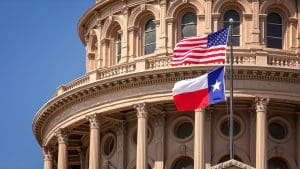The economic crisis caused by the coronavirus pandemic poses a triple challenge for tax policy in the United States. Lawmakers are tasked with crafting a policy response that will accelerate the economic recovery, reduce the mounting deficit, and protect the most vulnerable.
To assist lawmakers in navigating the challenge, and to help the American public understand the tax changes being proposed, the Tax Foundation’s Center for Federal Tax Policy modeled how 70 potential changes to the tax code would affect the U.S. economy, distribution of the tax burden, and federal revenue.
In tax policy there is an ever-present trade-off among how much revenue a tax will raise, who bears the burden of a tax, and what impact a tax will have on economic growth. Armed with the information in our new book, Options for Reforming America’s Tax Code 2.0, policymakers can debate the relative merits and trade-offs of each option to improve the tax code in a post-pandemic world.

Raising the Corporate Rate to 28 Percent Reduces GDP by $720 Billion Over Ten Years
The Options guide presents the economic effects we estimate would occur in the long term, or 20 to 30 years from now, but we can also use our model to show the cumulative effects of the policy change—providing more context, for instance, about how the effects of a higher corporate income tax rate compound over time, which we estimate would reduce GDP by a cumulative $720 billion over the next 10 years.
4 min read

More Tax Hikes Than Investment Projects?
Tax hikes implemented in the near term might undermine Spain’s economic recovery. Spain should focus on implementing tax reforms that have the potential to stimulate economic recovery by supporting private investment and employment while increasing its internal and international tax competitiveness.
5 min read
New Research Finds Limited Effects on Taxpayer Behavior from Pass-through Deduction
While proponents of the Section 199A pass-through deduction claimed it would boost investment and critics claimed it would encourage tax avoidance and income shifting, new research casts doubt on both claims.
3 min read
Imposing New Taxes on Peer-to-Peer Car Sharing Will Not Help Texas Economic Recovery
Imposing the rental car excise tax on peer-to-peer car sharing would be a move in the wrong direction by expanding a costly and distortive tax for visitors whose business will help Texans recover post-pandemic.
4 min read
Treasury’s Latest Pillar 1 Proposal: A Strategy to Split the Riches or Give Away the Store?
New international tax rules on super-profits would disproportionately impact U.S. companies however they are designed. The question that Treasury should answer is why limit the policy in such a way that magnifies that disproportionate application and the risk to the U.S. tax base.
6 min read
Biden’s Corporate Minimum Book Tax Narrows, but Problems and Uncertainties Remain
The corporate tax base should be reformed directly, rather than piecemeal through a complicated and burdensome separate tax applicable to a small number of companies.
5 min read
Denying Deductions for Pharma Ads Is Bad Tax Policy
The “End Taxpayer Subsidies for Drug Ads Act” would prohibit companies from deducting the costs of prescription drug advertisements directed at the public. However, the bill’s title is a misnomer: the deduction is not a tax subsidy.
2 min read
IMF Tax Proposals: Shrink Inequality or Sink Post-Pandemic Recovery?
To help countries face the pandemic-related financing needs while reducing inequality, the International Monetary Fund (IMF) has released a series of policy recommendations based on a temporary COVID-19 tax, levied on high incomes or wealth.
4 min read
Biden’s Tax Plan Would Restore U.S. Exceptionalism—But Not in a Good Way
No other country has tried to enforce some of the policies that the Biden administration is proposing. Embarking on such uncharted course would set the U.S. apart from global tax policy norms and best practices and could harm American competitiveness.
4 min read